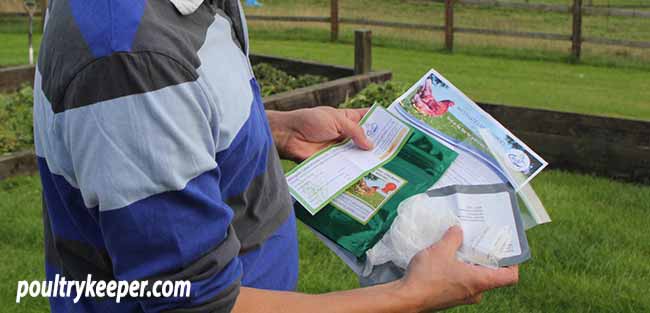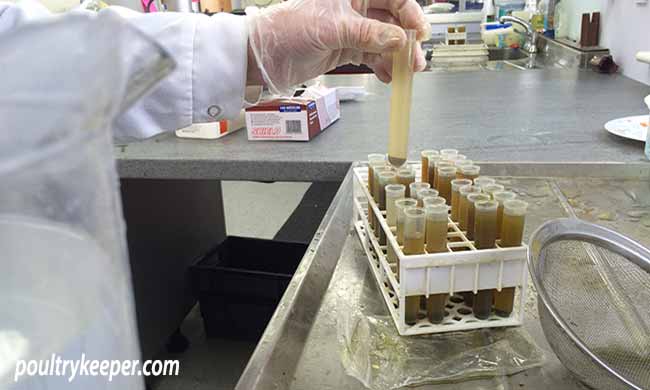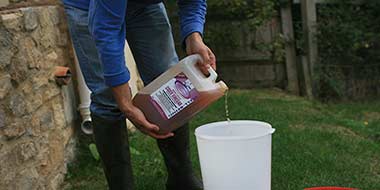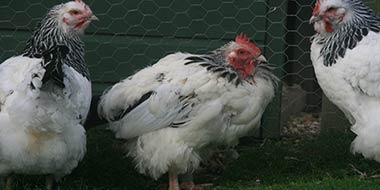
Keeping
Chickens
Healthy
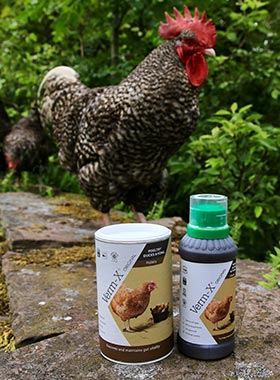
I am passionate about keeping my chickens healthy and don’t like to take any unnecessary risks. I can’t afford to get it wrong with over a hundred hens, including rare breeds and imported birds.
After many years of the same routine of worming my chickens twice per year in spring and autumn, in 2015, I changed to a natural approach for worming.
As part of this holistic approach, good husbandry has come first; however, I also use some products. I have used Verm-X for chickens and have seen a positive difference in my flock’s health.
What is Verm-X for chickens?
Made in Great Britain, Verm-X for chickens is available as a liquid or a small pellet and is a unique combination of herbs (including cinnamon, garlic, peppermint, fennel and thyme). It is 100% natural and has organic certification.
Verm-X is sold as an active formulation that helps restore and maintain gut vitality. Keeping a healthy digestive system can benefit the health of your chickens.
The makers cannot call Verm-X an “anthelmintic” or “wormer” since it is not a licensed medicine but classified as a herbal product.
Herbal products do not have an egg withdrawal period, as many medicines have.
Holistic vet Nick Thompson of Verm-X says, “Any single herb is thought to contain 4 to 6000 active components. In most plants, we only know the top dozen medicinal molecules. Herbs can affect the body and parasites in ways the pharmaceutical companies can only dream of.”
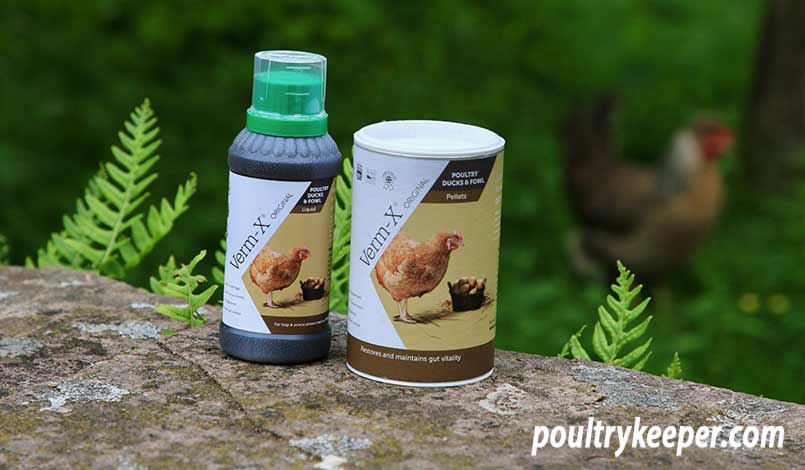
Verm-X and my chickens
When I first came across Verm-X for chickens in 2009, I was worming my chickens twice per year, and this wasn’t unusual at that time. The manufacturers of chemical wormers and poultry books recommended this as a precaution. It was normal for poultry keepers to routinely worm chickens in the spring and autumn just in case they were carrying worms.
A large tub of wormer around that time was £12-£14 and came in a commercial-sized tub that would last several years. Although some people might have wondered if it was vital to worm chickens so often, the only other way to check whether your birds had worms was to go to your vet and for them to do a faecal egg count.
The ‘problem’ with this approach was the cost. Typically it would be upwards of £50 for a worm egg count and possibly a vet’s consultation fee, so it was easier to reach for the tub of wormer and continue following ‘good practice’. A typical hybrid hen cost £10 in those days, so you can imagine that people keeping chickens on a frugal budget didn’t want to spend over £100 each year on faecal egg counts!
Around this time, I met Philip Ghazala, the founder and MD of Verm-X, at a poultry show. He told me about Verm-X For Poultry, an organic product made from a unique combination of herbs. He handed me a tub of Verm-X pellets for my chickens and encouraged me to try them for a couple of months- so I did.
My 'trials' and the conundrum
I used the pot of Verm-X pellets in three pens of my chickens and tried comparing their health against other pens where I had been using a wormer routinely.
At the end of the Verm-X pack, I felt the chickens having Verm-X were fit and healthy and were laying well a few months later. They also liked the taste, so it was easy to hand-feed them as treats.
I published my review on Verm-X for chickens here on Poultry Keeper, but of course, testing products like this at home presents a conundrum – tests aren’t scientific, they can only be subjective, so I couldn’t really ‘prove’ that a holistic route did or didn’t work!
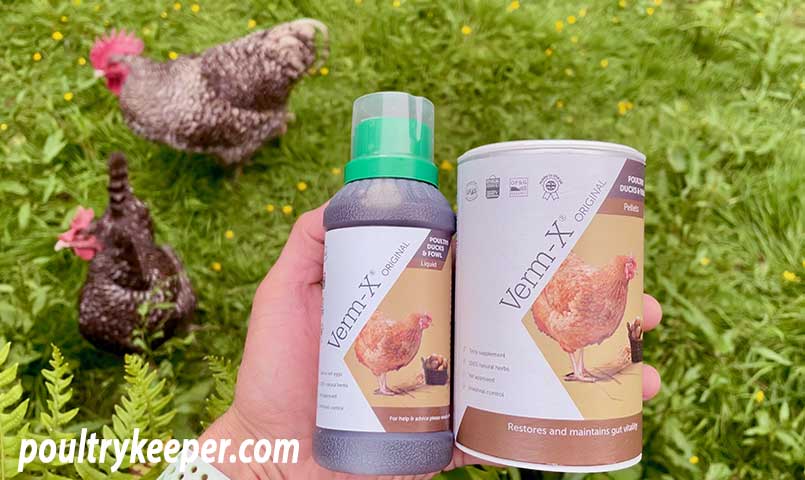
Taking a more natural approach
So I know at this point, there will be people who believe in a holistic approach and others who doubt it works and will take a more conventional medication route.
I like to think I have taken a path down the middle!
With articles highlighting antibiotic resistance appearing regularly in the news and worms becoming resistant to anthelmintics (wormers) in many farmed animals, I decided to try a natural approach.
In 2015, I stopped routinely worming my chickens twice per year. I now use a selection of natural products: Apple Cider Vinegar at least weekly, Garlic (fresh, crushed in water), Diatomaceous Earth (mostly over the summer months for mites), and more recently, Verm-X for poultry.
As I said in the opening paragraphs of this article, I’m not keen to take any unnecessary risks with my hens, so I am checking my natural approach is working by sending off a faecal egg count. This is often called a worm egg count, where somebody counts worm eggs and larvae under a microscope.
The difference between now and when I first tried Verm-X is to get a worm egg count kit for a very reasonable £15. You no longer have to go to a vet. They email the results to you and make recommendations if you need to worm your chickens.
Getting A
Worm Egg Count
Using a worm egg count kit is relatively straightforward. There are gloves, a collection bag for samples and a pre-paid envelope. The worm count takes place in a lab under a microscope, and the result is returned by email advising you of the number of eggs and whether you need to worm your chickens.
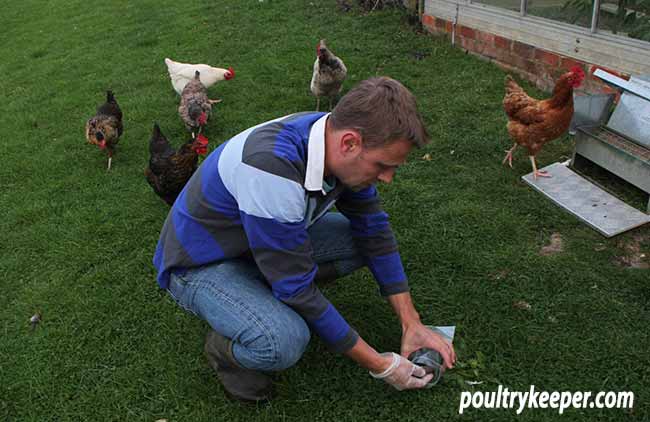
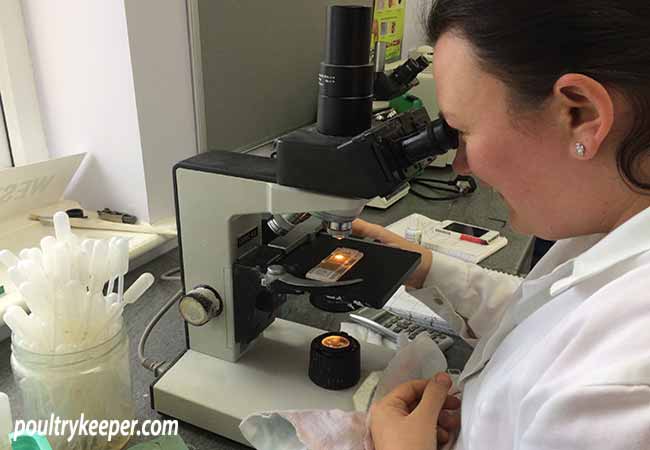
Conclusions
Regular testing (every 3-6 months) supports me taking a more natural approach, including Verm-X, and stops unnecessary, routine, worming.
I no longer routinely worm my chickens unless I confirm there is a problem with a worm egg count.
Natural products like Verm-X for chickens are a gentle approach and take some time to work, so I believe they should be seen as a long-term strategy to support your flock’s health, not remove a confirmed worm burden. That would be asking too much and be too risky, in my view.
Since 2015 (I am writing this in February 2021), I had only had a slightly raised worm egg count once in 2017. This was later isolated to one pen of chickens that I had purchased a few weeks earlier!
If you can use as many good practices as possible, such as changing your chicken’s pasture periodically, keeping grass short so that Ultra-Violet from the sun can kill worm eggs and avoid mud in runs, then we can take a natural approach.
To ensure your approach is working, you can use a worm egg count at a reasonable cost.
There is also some information about Verm X on the “keeping chickens: A beginner’s guide” website if you would like more information.
You can buy Verm-X here.
If you have any experiences with Verm-X, I would love to hear from you. Please feel free to leave me a comment below.

